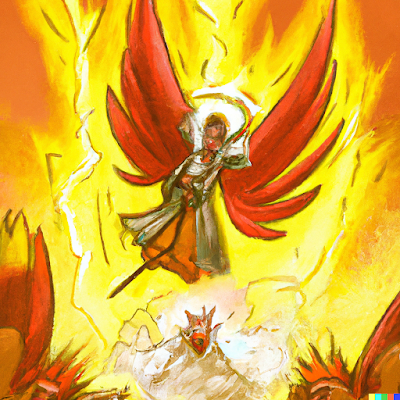Why are there angels in the D&D monster manual?
In modern D&D – 5E and its third-party cousins – Great Wheel Cosmology necessitates a mirror to fiends, so angels appear for taxonomic thoroughness. Mechanically, I presume the game's designers view the angels in the 5E.14 Monster Manual as summoning spell targets and NPC allies for the (presumably good) PCs.
Fashioning a combat encounter between these holy dudes and those putatively good PCs requires some contortions. D&D 5E makes its angels fluent in all languages, and telepathic as well, edging out the possibility of even a misunderstanding when these creatures descend from the heavens. A footnote in the manual indicates that fallen angels exist, but they don’t get any interesting mechanical implementation (for that, try the Chained Angel from Kobold Press’s Tome of Beasts).
D&D in its earliest forms didn’t have them, and many throwback systems still eschew them. The Old School Essentials bestiary, for example, lacks an entry for angels.
When angels do appear in like-minded products, like Skerples’ beautiful new book The Monster Overhaul, they are decidedly old testament, plausibly dangerous, or decidedly unknowable. In keeping with the book’s focus on table-readiness and applicability to adventures, Skerples’ angels are loaded with danger, friction, and implicit conflict.
This Far You May Come and No Farther
So imagine an angel confronting the PCs. Clearly it can happen because of something they have done in the game. Some action that made sense to them or solved a material plane-concern, but angered those on high. I’ve done that one myself.
But what else? What if the angels confront high-level PCs because they are high level?
It may not feel like an obvious conflict, but it’s firmly rooted in myth. From Prometheus to Babel, gods have punished mortals for attempting to rival them in power and glory. And PCs get harder and harder to distinguish from gods as they reach high levels.
Applying this mechanically can be quite simple. In a leveling system that goes from level 1 to 20, adventurers might begin to attract the attention of gods around 10th level (5E clerics gain the divine intervention ability around this time; a convenient demarcation point).
The gods might be merely watchful when PCs hit 10th level. I assume tier 3 adventurers are quite rare, unless a setting specifically says otherwise; and many adventurers who do reach that level retire or die before getting much further. But for every additional level the PCs attain, the gods become more wary, suspicious, jealous, and eventually angry.
By the time characters reach level 20, some sort of confrontation – violent or otherwise – is inevitable.
O Come At Me Bro, All Ye Faithful
All well and good for the wizards, thieves, and fighters out there. But what about clerics, paladins, and warlocks? Their adventuring life has been defined by the divine.
Warlock is easiest. Unlike most of 5E’s classes, Warlock has tension built in it at the ground level. A 20th level warlock is strong enough to directly confront the compromising nature of the pact with their patron. Even if they simply want their freedom, the patron may see them as too powerful and dangerous to just let loose. And the PC may even decide to take the patron’s place and begin issuing their own pacts.
For paladins and clerics, there’s always the option to say that at the end of the day, their arrangements with their gods were just warlock pacts with better optics. Maybe the conflict plays out in a similar fashion to warlocks. But it can go other ways.
A good-aligned god might stand aside for a worthy paladin or cleric to replace them – that actually happened in the 5E game I ran past level 20. But even if the god in question is fine with ceding the stage to their protégé, there’s no guarantee other gods will be OK with it. Most mythological gods in the real world do not tend to their portfolios in cool isolation, but instead are highly social creatures, fostering alliance and rivalries within a contentious pantheon. And there could be many reasons for those rivals to see the PC’s ascension as an affront to the gods.





No comments:
Post a Comment